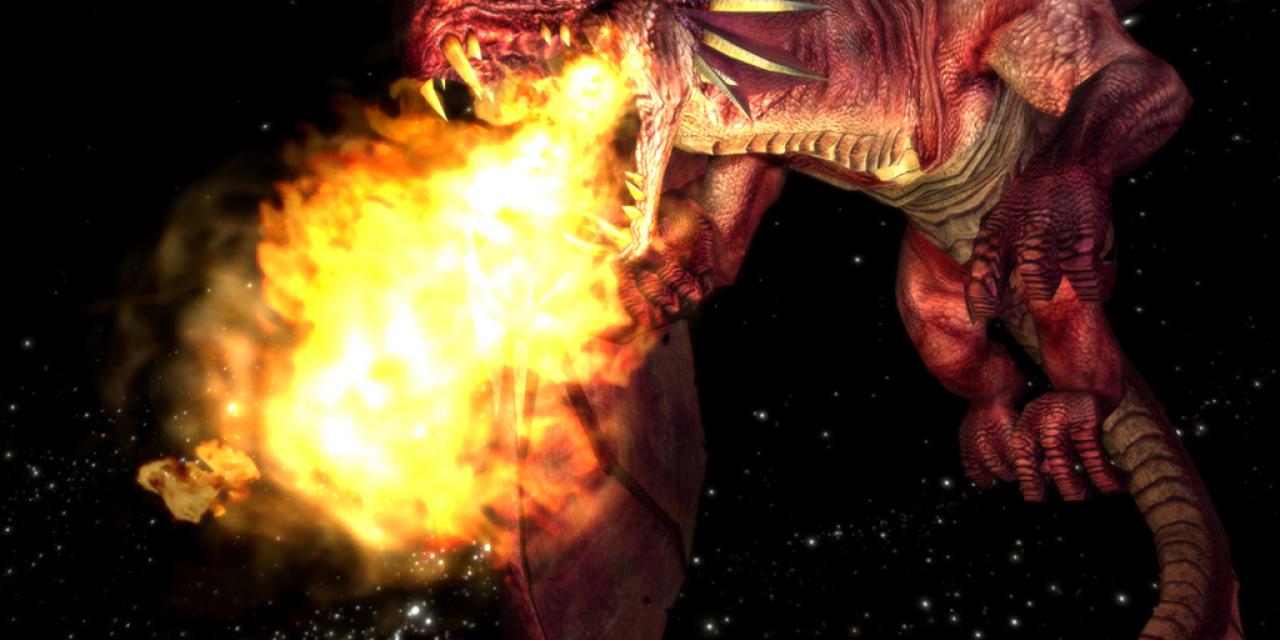
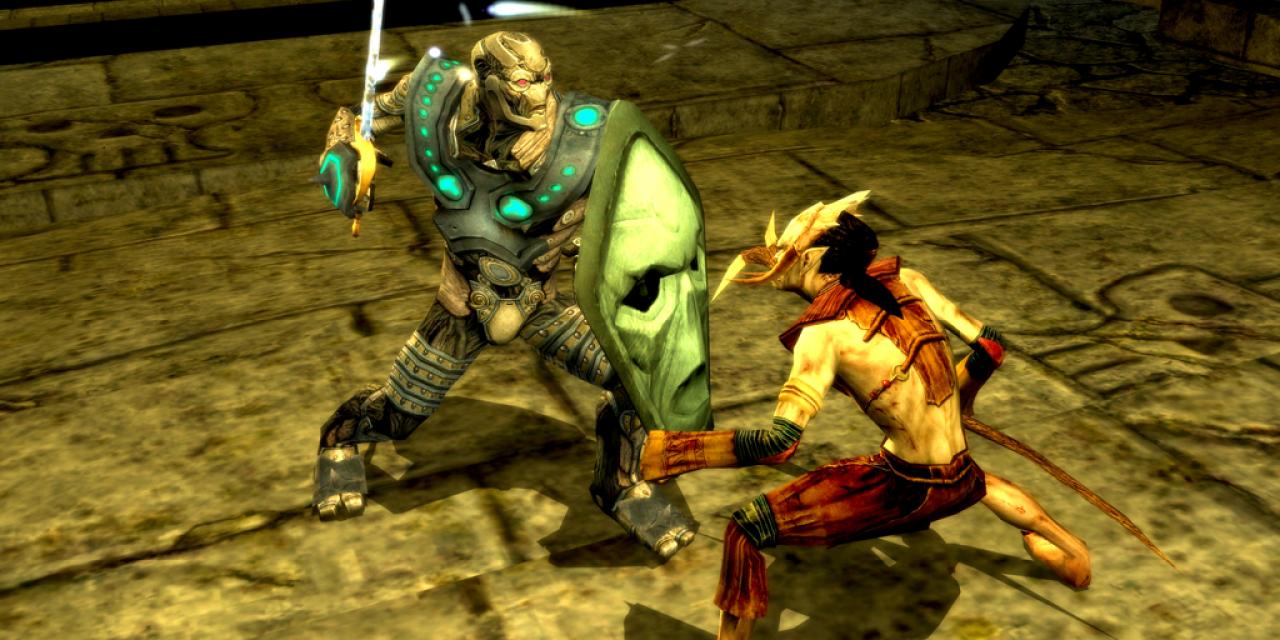
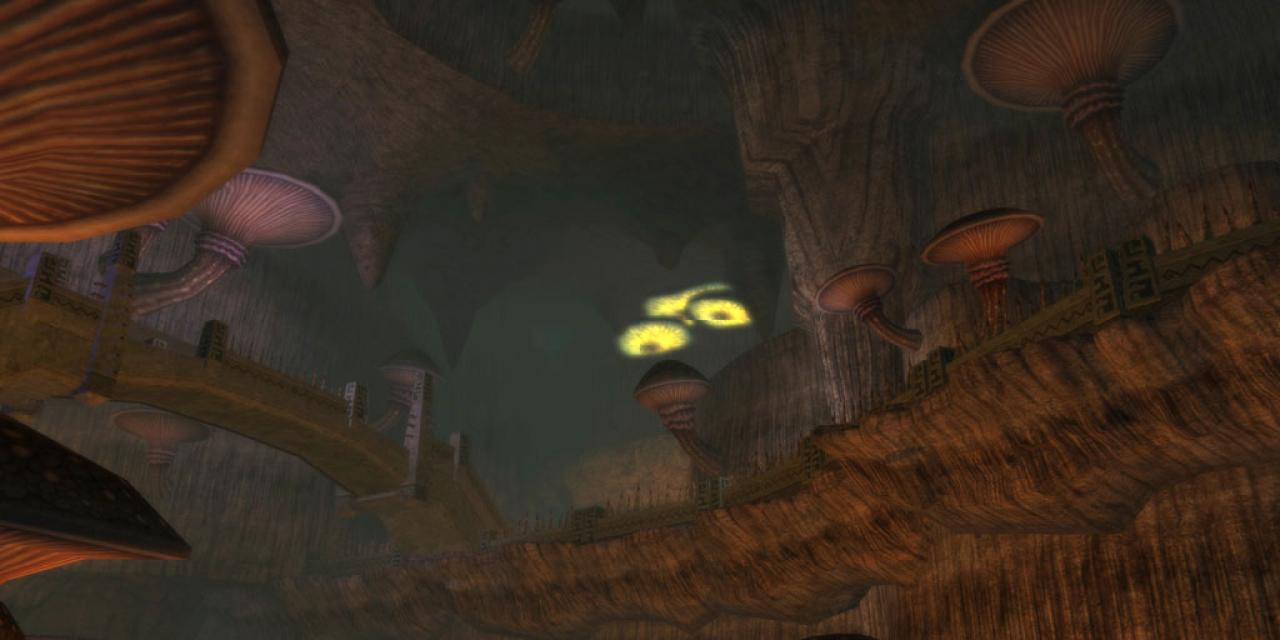
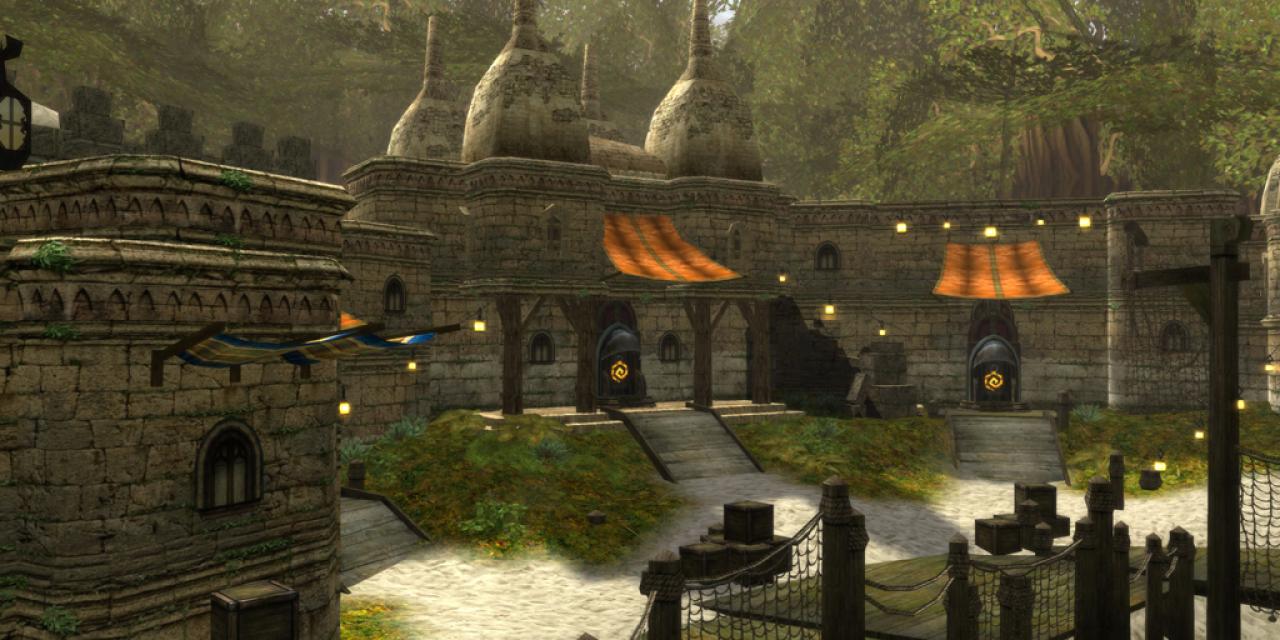
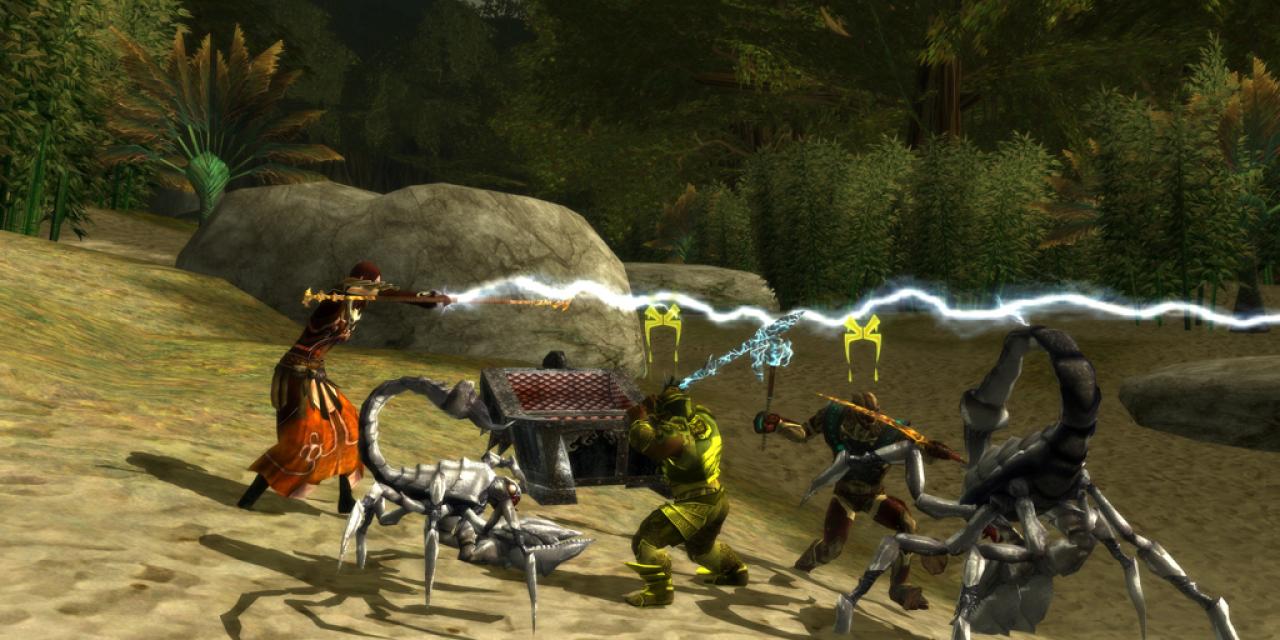
Another quarter, another large-scale MMORPG set to turn the industry on its head. This time it's offering up a fantastic franchise's label on its cover, as well as the promise of a new take on many elements that have been fixtures in the genre since its incarnation. Does it hold up to its word? Can it compete with the giants that hold the industry by the jugular?
With both MMO veterans from the development of the Asheron's Call series on the team, as well as dozens of years combined pen and paper Dungeons and Dragons experience, the license has been in very capable hands. These hands have shaped the newest and best contender for the MMO king title since the release of World of WarCraft.
D&D Online is both extremely creative and completely redundant at the same time. It is true that some is borrowed from its cousin MMOs, but D&D Online uses these borrowed elements in whole new ways. Present are the persistent world and instance concepts, but they are handled so uniquely. For example, the expansive city districts are very full, especially within the gathering places like taverns. However, once you accept a quest and head to its origin location, you'll enter the quest area. Here only you and any party members you might be journeying with can enter. Guild Wars and the City of Heroes universes each have this same feature, but D&D Online handles these in its own way.
This is also one of the most beautiful experiences my eyes have had the honor of perceiving. On the most basic level, Dungeons and Dragons Online is a fantastic sight to behold. It has sprawling environments with hundreds of detailed items and very realistic textures and animations. The graphics options are all here in full bloom, so to speak, with the controls right in your hands. Things like specular lighting, multi-pass lighting, bloom and blur effects, high-resolution textures, and stencil shadowing make this game stand out among any PC title on the shelf. However, it isn't just the technical elements that make this a feast for the eyes. The artistic style present truly makes the world of Eberron come to life before you. Little details like armor being textured to show pieces and straps, decorations in the taverns looking right out of a storybook, and the individual customization of the characters make for a very realistic and at the same time very surreal world.
Characters are customizable to their very core. If you're not an MMO junkie, or, more importantly - if you've never picked up a D&D book - don't worry. There are useful hints and guides the game pops up with to show how each option affects the overall person your character becomes. Or, if even these guides seem too deep for you, or perhaps you are truly anxious to jump into the action, there is an automatic character creation function. First players must make the all important decisions like race and class. Choosing a class in DDO is a little easier than most MMOs because the game shows a video for each, displaying its role in the game and many of its abilities, a very nice touch. Players aren't expected to make quite as much of a shot in the dark first time they choose their station in life. Then players can customize everything about the character's facial features, hair color, and scars. This is a very simple but extremely intuitive feature to help separate your fighter from every other dwarf in the game. Finally players can make the statistically important choices, such as allocating stat points and skill points. Each of these has a fair description, though a few of them seem rather useless the majority of the time. Then it's time to dive in!
Dungeons aren't all dank and creepy holes in the ground that only the greedy and the courageous enter. In Stormreach and the surrounding continent, Xen'drik, dungeons come in all shapes and sizes. While many dungeons are the typical thought of dark and spooky tunnels and caves under the city or out in the wild, sometimes "dungeons" take the form of abandoned portions of the city itself, and occasionally even a currently occupied area within Stormreach. These dungeons are very involving, bringing actual goals and status to those who can complete them. Many different types of objectives can be completed in these dungeons: things like protecting goods, wiping out an infestation, or stealing an item of power are regular fares. There are also raid adventures, which are large-scale combat adventures that take a party twice the normal size (up to twelve players) out of the influence of Stormreach and into the wilds to fight off enemies or conquer areas.
When you enter a dungeon, you have an objectives screen appear, showing what the main goal of the adventure is, what level it is intended for, and how lengthy the adventure is. Many are short (approximately ten to thirty minutes) mini-adventures, for those looking for a quick stretch in the game between real-life obligations. A good number are long and sprawling tales of heroics with separate villains and multiple locations, bringing the full D&D spirit out to the forefront. These adventures can sway your reputation up in the eyes of a house or two, and down in the view of others.
MMO veterans will be surprised by how slow advancement can be, but every gain is worth the effort. Instead of quickly gaining the first dozen or so levels and then hitting a difficult wall to gain each subsequent level as is the standard recently in MMOs, Turbine made sure the game retains the rich element of advancement felt in the source material. In the pen and paper model of D&D, levels are something strived for and worked to achieve for long periods, often across multiple play sessions. When they are achieved it shows a great deal that the character has gone through and experienced, making him or her able to face greater challenges based on this knowledge gained. D&D Online kept this element, finely adapting it to the MMO structure. Characters gain ranks, several of them per level, and each rank represents one topic or achievement that the character has mastered. Upon gaining this rank, a character can return to their trainer and learn a new ability or improve a previous one by use of the Action Point they gained. When all five ranks have been gained for a given level, the character achieves the ascent into the next level, bringing more life and spell points, more abilities, and an improvement in trained skills.
Turbine did have to change some elements a bit from the source books, but most of it was handled very well. Combat, for example, is no longer turn-based. While this sounds shocking and appalling to most D&D players, take it from a fellow player: they handled it pretty well. In exchange for not having all the time in the world to ponder actions and to plan attacks, Turbine did at least let you have the freedom to attack the way you want to attack. Individual attacks can be done on a swing-by-swing basis, with a mouse click. You can also dodge or block in real-time with a tap of a button causing your character to tumble out of harm's way or throw up their shield. Instead of gaining more attacks per round, characters' recovery time between swings is cut down to show their experience handling the weapon. This constant barrage of actions can be toned down to turning on auto-attack and simply worrying about blocking occasionally, but why cut out so much fun?
Magic, also, is a little different. Your favorite spells are here, but instead of having a certain number of spells per day in a given level, Turbine went the route of Spell Points (think Mana). This works out almost exactly the same, because each spell has a specific number of spell points it requires to cast, making for a total number able to be cast each day. Metamagic feats are very much present, making both arcane and divine magic much more potent or much more useful, but they cause each spell cast under their influence cost a bit more of your spell points for the day.
Often forgotten or severely weakened, Rogues will finally have their day in the ... shadows. Turbine has made sure that all of the intricate and exciting elements of the rogue are not only present, but vital. Stealth is an ability all players can attempt to use, but only rogues can master. The game has a shadow meter, to show how well your character believes he or she is hidden. Of course, at lower skill levels, you might think you're a ghost's shadow when you've forgotten you're still holding a lit torch. Traps are in nearly every adventure, and often times they are widespread and deadly. This is the sole territory of rogues, making them a very well liked member of any party.
Frankly, this is one of the best experiences a role-play fan can have. It retains all the great elements of D&D while adding the ability to connect with a pool of thousands of players and a constant influx of new adventures and dungeons to explore. Aesthetically it's one of the most pleasing games to ever hit the market, and stylistically it retains the flavor of a living world while spicing it up with players from across the globe. Anyone looking for an alternative to the standard thoroughfare of MMOs or old school fans of D&D that haven't made the leap to electronic entertainment should definitely take notice. Dungeons and Dragons Online: Stormreach is a call to adventure that should be answered.
Bottom Line:
There has always been a feeling of something lost when a role-player must move to the PC to get into a game. A feeling that something is lost, and that they are somehow removed from the fun when it is displayed for them in digital display. In MMORPGs, the community element is there, but all of the high fantasy and deep plotline are lost to the wilds of grinding the same mobs for hours. With the release of Dungeons & Dragons Online: Stormreach, role-players can breath a long-held sigh of relief. That rift between tabletop gaming and MMORPGs has just been bridged.
Reviewed by Greg Atkinson
